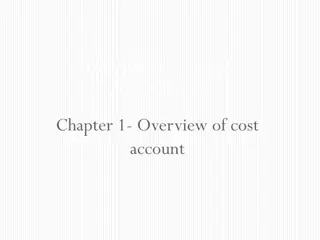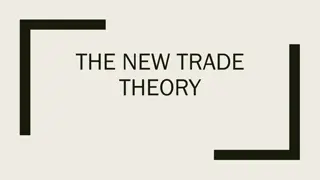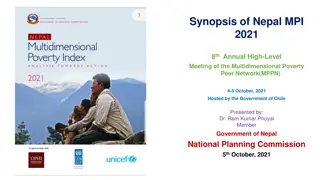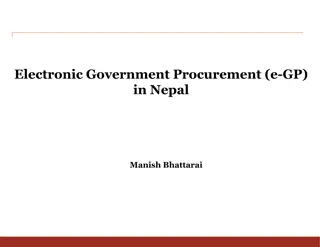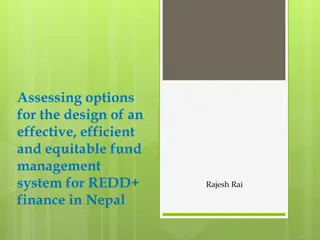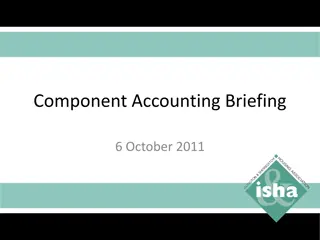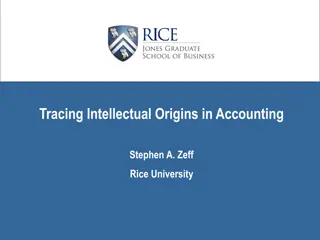Structuration Analysis of Central Government Accounting Practices and Reforms in Emerging Economies: A Study from Nepal
Delve into the nuances of central government accounting practices and reforms in emerging economies, focusing on Nepal. The study explores why key stakeholders resist externally-driven changes, investigates the unintended consequences of reforms, and highlights the role of organizational actors in shaping accounting changes. Discover the challenges faced in implementing reforms, such as the stability of cash accounting in Nepal despite efforts to transition to accrual accounting and program budgeting.
Download Presentation

Please find below an Image/Link to download the presentation.
The content on the website is provided AS IS for your information and personal use only. It may not be sold, licensed, or shared on other websites without obtaining consent from the author. Download presentation by click this link. If you encounter any issues during the download, it is possible that the publisher has removed the file from their server.
E N D
Presentation Transcript
Structuration Analysis of Central Government Accounting Practices and Reforms in Emerging Economies: An Illustrative Study from Nepal Pawan Adhikari and Kelum Jayasinghe Essex Business School University of Essex, UK
Aim Generate a nuanced insight into central government accounting practices and reforms in emerging economies Drawing on Stones (2005) strong structuration theory (SST), we have investigated why and how the key internal stakeholders of central government accounting in Nepal, including government and professional accountants, higher-level officers and administrators, international consultants, politicians, and auditors, are involved in the reproduction of routinised accounting practices, resisting the externally-propagated changes
Public sector accounting research in emerging economies Much attention has been given to international monetary organisations, mainly the World Bank and the International Monetary Fund (IMF), and the institutional pressures that these organisations have exerted to instigate reforms Accounting changes undertaken have often been overshadowed by unintended consequences and failures Causes for unintended consequences: inadequate planning; poorly grounded reform recipes, i.e. the adoption of the one-size-fit approach; a lack of human resources and IT systems; and the intervention of consultants
What is missing in the public sector accounting literature Issues of organisational actors (agency) at the ontic (micro) level and the influence that these actors can have in making public sector accounting reforms in emerging economies a success (exceptions include Uddin & Tsamenyi (2005) and Jack & Kholeif (2008)) Organisational actors resist the proposed accounting changes that are incompatible with the existing practices and structures
Why Nepalese government accounting Stability of cash accounting, despite several endeavours over the last five decades to implement reforms such as accrual accounting and programme budgeting, and, more recently, the Cash-Basis International Public Sector Accounting Standard Provides a prominent research setting to explore the role of agency and structures, factors which play a key role in executing accounting practices and changes
What is Strong structuration theory (SST) Giddens s structuration theory concerns the interactions between agency and structures. The term structural modalities has been used to incorporate three different types of abstract structures, i.e. significance (interpretative schemes), legitimation (norms which sanction certain forms of conduct), and domination (the exercise of power) Critics of structuration theory mainly focus on the fact that there is an overemphasis on the relatively abstract (macro- level) analysis, as well as the adoption of high-level institutional analysis, often neglecting the role of agency in the duality of structure The role of external structure, which is represented by position practice relations and which plays a central role in the conceptualisation of the link between structures and agencies at the meso and ontic levels, has been claimed to have been downplayed both in the theory and in the extant structuration-based accounting literature
Strong structuration theory (SST) (Stones, 2005) is envisaged as an attempt to address some of these perceived limitations of Giddens structuration theory Accounting studies drawing on the SST have significantly increased in recent years A key aspect of the SST has been its endeavour to bring the role of agency to the foreground of the structuration process through the agents conduct and context analysis SST is built on by breaking the duality of structure into four analytically-distinct components constituting the quadripartite framework-external structures, internal structures within the agents, active agency, and outcomes
External structures: mediated largely through position practice, which is a social position, its associated identity and practice Internal structures: analytically divided into general dispositions (i.e. socio-cultural schemas, discourses and world-views, moral principles, attitudes ) and conjuncturally-specific knowledge of the strategic terrain and how one is expected to act within it Active agency: the way in which agents draw on their internal structures and use their knowledge and understanding of external structures Outcomes: can be intended or unintended feedback on both external and internal structures, either preserving them faithfully or changing them as they are enacted
Conceptualising positionpractice relationships, external structures as a condition of action, and the ability of agents to do otherwise and unintended consequences, SST has offered a renewed way of interpreting the dialectic of control in terms of resistance For generating a resistance, the agents (the agents-in- focus) must possess three types of property, which include perceived power or capability in relation to other actors, adequate knowledge of relevant external structures, including alternative avenues of possibility, and an ability to gain requisite reflective distance from their conditions of action The use of SST in our study not only helps us generate a nuanced picture of the everyday government accounting in Nepal at the ontic level, but also theorises how the resistance to externally-propagated changes is being executed
Research Method A circular design (i.e. SST to explore day-to-day government accounting in Nepal at the ontic level, and to further extend an element of theory (i.e. the dialectic of control in term of resistance) Data sources: document analysis and 40 semi-structured interviews Agents-in-focus: government accountants at different hierarchies Agents-in-contexts: joint secretaries (first-class or higher- level officers/administrators) and officers (administrators/under-secretaries/bureaucrats) at ministries. Auditors at the Auditor General s Office (AGO); and professional accountants (chartered accountants) at the Institute of Chartered Accountants of Nepal (ICAN) and the Accounting Standards Board (ASB)
The Nepalese government accounting context, practice, and reforms Cash accounting since the 1960s Government accounting is a separate discipline The FCGO is an organ for government accounting and accountants Central government accounting includes three levels: operating-, central-, and district-level accounting Accrual accounting and programme budgeting and more recently the Cash Basis IPSAS have been proposed to improve planning and expenditure management and discharge wider accountability No evidence that these reforms have proved successful
Empirical analysis and discussion Structures external to government accountants (the agents-in- focus) The social position of government accountants and their social identity are distinct in Nepal from other public administrators Dual control is imposed upon accountants Government have inherited a range of prerogatives and obligations relating to the articulation of financial/budget management Several clusters of actors are identified who have position practice relations with government accountants, including higher-level officers at the FCGO and ministries, administrators, auditors at the AGO, international consultants, politicians, and professional accountants at the ICAN and the ASB
Government accountants (the agents-in-focus) and internal structures Internal structures of government accountants are shaped around the budget and they are aware of the rewards and sanctions likely to follow from their actions. Other provisions and regulations not related to budget implementation have been neglected Government accountants conjuncturally-specific knowledge of the strategic terrain, their ability to reflexively monitor the knowledge and social position of other agents, and a lack of fear about the potential consequences have led to the persuasion of manipulative practices (disposition) The new Joint Comptroller, I think he was from a revenue group, asked me to improve the system for recording advances in the MTEF projects, so as to make the transactions more transparent. I told him that transactions related to advances are not easy to categorise as they can be accommodated into five or six different budget items. He later gave up the idea and continued with the existing system.
Active agency of government accountants Government accountants are aware of various position- practice relations and the conduct and context of networked agents-in-context Social position has offered government accountants perceived power (or capability) to dominate other actors- in-context in the duality and dialectic of control Multiple dialectic of control relations have been taking place in Nepalese central government accounting, which have resulted in the resistance to the externally- propagated changes:
Contradictions between government accountants and administrators/higher-level officers Contradictions between government accountants and professional accountants and international consultants Contradictions between government accountants and auditors Contradictions between government accountants and politicians
Outcomes The very objectives and requirements of the proposed accounting measures, i.e. the Cash-Basis IPSAS and accrual accounting, which call for a greater role of accounting beyond maintaining budgetary compliance, have remained contradictory Multiple dialectics of control exist between government accountants and other actors, the ultimate outcome of which has been the resistance of reforms and the reproduction of traditional budget routines Government accountants are dominating the position power relations because of their capability in relation to other actors, their trust between each other, and their knowledgeability in terms of the general dispositions and conjuncturally-specific knowledge of other actors
Summary and conclusions Status quo in practice and resistance to reforms characterise Nepalese central government accounting The use of SST has enabled us to focus beyond institutional analysis, which has dominated the extant public sector accounting literature in Nepal and other emerging economies, to the agents context and conduct analysis and empirically illustrate how the accounting practice is reproduced and the changes resisted in the duality and dialectics We have contributed to both the Giddensian-based work in the public sector in emerging economies, by extending why and how knowledgeable agents draw upon and reproduce the structures in specific settings, and to the emerging SST literature, which has made a call to apply the SST in the setting of emerging economies
There exist significant differences between government accountants and the agents-in-context due to their position practices. The position practice relations of government accountants have been constructed by factors such as their formal separation from other bureaucrats and dual accountability being imposed on them The power over budget (allocative resources), which government accountants have inherited due to social position and their conjuncturally-specific knowledge, have made them capable of dominating the agents-in-context in the network of relations Government accounting reforms proposed over time have been denied because the very objectives of these reforms have contradicted the dispositions, conjuncturally-specific knowledge, and agency of government accountants and undermined their ontological security Multiple dialectics of control in terms of resistance are evident in Nepal, which have resulted in the reproduction of everyday government accounting practices and resistance to the World Bank-led reforms
SST has helped us enrich our understanding of central government accounting in Nepal, incorporating both the practices and changes Public administration in most of the emerging and less- developed countries is centred on an annual budget and government accountants hold a powerful position due to their role in executing budget and maintaining compliance. It is rather unlikely that any externally-propagated reforms would be implemented successfully in emerging economies without changing the emphasis on budget, and without a shift towards the agency of government accountants and other actors, which is also constructed on the day-to-day budgetary practices. The central government accounting in Nepal is just one illustration in this regard The End









